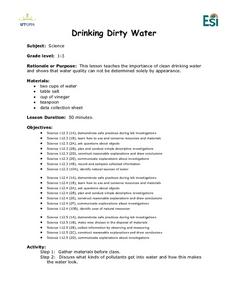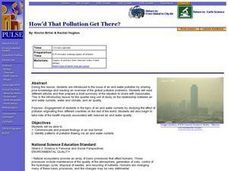Curated OER
English Grammar: Part of Speech
An uncountable noun? (Water) The Royal Order of Adjectives? (possession, quantity, quality, size, age, shape, colour, origin, material). Although this presentation on the English parts of speech is designed for language learners, the...
NOAA
Where Have All the Glaciers Gone?
What happens when ice melts? Well ... water happens. When that melting ice is a glacier, the amount of water that results produces change throughout the world. Middle school science sleuths uncover the truth about global warming, the...
Curated OER
Raven Chapter 10 Guided Notes: Photosynthesis
Kim B. Foglia has designed a comprehensive series of AP biology worksheets. This one focuses learners on the progression of photosynthesis in plants. In this assignment, they identify structures and steps on high-quality diagrams, use...
Curated OER
Protists and Fungi
Here is an outstanding presentation on protista. It lists general characteristics, and then moves on to describing three different categories of protists. For each, viewers learn physical features, behaviors, and means of reproduction....
Curated OER
The Oceans, Waves, Tides & Currents
Your introductory lesson to oceanography can be outlined with this apropos presentation. It touches on the physical features of the ocean floor, waves, tides, and currents. One small issue is that some of the graphics are not of the...
Syracuse University
Harlem Renaissance
The music and literature of the Harlem Renaissance defined American culture, including its poetry. Using a poem from the period, individuals explore its musical qualities and how it is reflective of the period. Then, they use what they...
Curated OER
Water in the Air
Students simulate how clouds block radition and how water in the air condense around containers.
Curated OER
Drinking Dirty Water
Students consider the importance of clean drinking water. They conduct a taste experiment with water, adding incremental drips of salt and vinegar to determine at which point it doesn't taste drinkable.
Curated OER
Groundwater Realities
Students review the components of the scientific inquiry method. In groups, they use the internet to research the sustainability of water resources in their community. They examine an environmental impact study, answer questions and...
Curated OER
Environment: How'd That Pollution Get There?
Young scholars examine how global wind and water patterns aid in the spread of worldwide pollution. In groups, they read articles about the domino effect of pollution and create posters displaying its journey. On blank world maps,...
Curated OER
pH
Learners use a Colorimetric test to measure pH and gain the importance to life in an aquatic ecosystem pH is. They explore the dramatic effect pH level can have on a water body. Students test the pH level of many water samples.
Curated OER
Eye On Conservation Drainage Basin
Middle schoolers are able to describe the importance of wetland vegetation. They describe the impacts human activities have on water systems. Students compare and contrast the effect of different soil types on water filtration.
Curated OER
What's in the Water?
Learners examine how pollutants can affect ocean animals. In this pollution lesson, students read a story about the ocean floor, think about what would happen to the plants and animals if the ocean became dirty or polluted, and conduct...
Curated OER
Give a Hoot - Don't Pollute at Black Bayou Lake
Fourth graders visit Black Bayou Lake refuge to observe the effects of land and water pollution. They photograph examples of pollution. They list the effects of land and water pollution. They write a persuasive letter to convince others...
Curated OER
It's a Mixed Up World!
Middle schoolers examine the importance of applying the scientific knowledge of elements, mixtures, and compounds to manufacture consumer goods and conduct civil operations, such as water purification. They also practice categorizing...
Curated OER
Mayflies on the Move!
Seventh graders investigate mayflies and their environment. In this biology instructional activity students examine the relationship between the mayfly and the water quality of Lake Erie.
Curated OER
Quality of Rice
Sixth graders research how farmers irrigate, harvest, and keep high standards of rice. In this farming instructional activity, 6th graders discover how rice, wheat and soy beans are farmed. Students make a chart showing the similiarities...
Curated OER
Sanitation and Disease Challenge
Students explore global health issues related to water and sanitation. In this Peace Corps lesson, students participate in an online game that requires them to examine how hygiene education, tapping springs, constructing wells, and...
Curated OER
Investigate Pine Creek!
Students are invited to become detectives in this Web-Integrated Science Environment (WISE) as they explore a local creek, its environment and ongoing status. Students participate in field trips, acquisition of data through water testing...
Curated OER
Group 7 - The Halogens
Properties and uses of the halogen elements are illuminated by this compact collection of slides. Examples of halogen reactions with alkali metals, hydrogen, and water are also explained. This is a nifty resource to support an...
Curated OER
Attenuation of Light in Water
Students explore what happens to light intensity as depth increases using a light intensity logger. They construct a PVC model to hold water and identify what factors could influence the amount of light attenuation.
Curated OER
Culmination of Mighty Waters
Third graders investigate the concept of bodies of water. The information is obtained from the internet while conducting research. Then students draw upon prior knowledge from a film to combine information for the purpose of creating a...
Curated OER
Why Is Our Stream Changing?
Learners test turbidity, pH, oxygen content and temperature of local stream. In this earth science instructional activity, students collect and record data from the experiment. They analyze findings and present it to class.
Teach Engineering
Density Column Lab - Part 2
Groups suspend objects within layers of liquids to determine the densities of different liquids and compare them to the densities of objects calculated in Part 1. The groups then carefully test their calculations by layering the liquids...
Other popular searches
- Clean Water Act
- Clean Water Act Epa
- Drinking Water Quality
- Water Treatment Plants
- Water Quality Testing
- Water Quality Index
- Watershed and Water Quality
- Nitrates and Water Quality
- Clean Water Act of 1972
- Clean Water Treatment Plant
- Water Quality Analysis
- Urban Water Quality

























